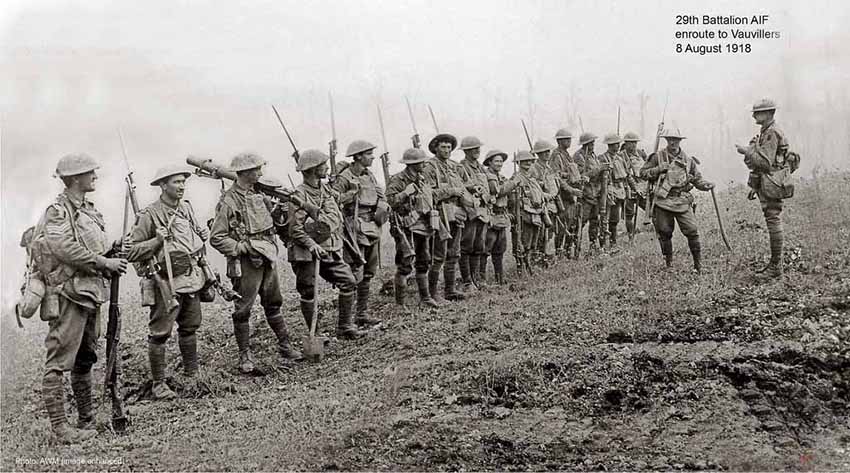By Tim O’Brien
THE celebration of Anzac Day has changed. When I was growing up, while the giving of a minute’s silence and a brief period of reflection on bravery and loss was part of the school year – and was a welcome day off – many questioned what “this day of days” was all about.
Of course, there were also many, the majority in fact, but mostly older Australians, who had no such misgivings, and proudly marched and gathered quietly and reverentially at dawn at cenotaphs in small towns and cities across the country.
Some time, then, a shift occurred. Maybe it was finally the recognition given returned soldiers from the Vietnam War – my friends among them – or maybe it was simply that the imagery and the stories made such great TV. Whatever it was, we began to think about Anzac Day differently, and with vastly more tears and flag-waving fervour.
I think part of the shift that gathered such strength in the '80s (and has endured) was due in some part to the power and imagery of Eric Bogle's astonishing song The Band Played Waltzing Matilda. It doesn't matter that the detail of the history is incorrect; it stands as a brilliant song.
I performed with Eric a number of times; the irony is that when I first heard him sing it (in about 1975-76), he was opposed to the RSL and its glorification of Anzac Day. He described The Band Played Waltzing Matilda as an anti-war piece. He was, as many of us were, opposed to what we thought (perhaps mistakenly) was a celebration of war in the marches, the “closed-door comradeship” and the Anzac Day boozing of the ageing diggers.
"And I ask myself what are they marchin' for...?" the maimed digger in Bogle’s composition asks. Yet it became a galvanising soundtrack for every Anzac Day, everywhere in this country.
Perhaps the misgivings that some of us carried around Anzac Day when growing up were because we didn't see then that this “one day” was the only day in 365 that so many returned soldiers, so deeply affected by their experiences, could shake the demons out in the company of the only people who could truly understand: their mates in battle.
It is fascinating to me now how they endured what they endured, and that so many carried such horrors until their last breath – a tangle of unspeakable images nestled forever in their heads, with little to no professional help nor advice to help them manage those images and experiences. For so many (my grandfather and other family members included), that post-war guts they showed in “getting on with life” is something few of us can comprehend.
I'm torn by Anzac Day. Transfixed by Gallipoli and The Somme, I think it has moved into a fest of glorification of sacrifice, of the creation of some mythical archetypal Aussie patriot with "king and country" burning in his chest, rather than the truth – of countless eager young men who were sold a deliberate lie and, unaware they were part of a cruel mathematical calculation of battlefield loss, being knowingly sent to their deaths.
I would love to see an Anzac Day when we reflect on the truth of this history rather than the confection that it has become; when the crimes of that murderous incompetent goat Field Marshall Haig are documented, when we reflect on the complicit disregard for Australian lives shown by Generals 'Grim Death' Grimwade, Hobbs, Sinclair-Maclagan, and by so many others, and when we reflect on the lies of our own Prime Minister, the craven, traitorous Billy Hughes.
What we need is a reminder of the stupidity of war, of the stupidity of “leadership” and, as far as the First World War is concerned, of the craven mendacity of the political classes and their murderous disregard for the young men and women sent to battle.
Sure, let’s honour the soldiers, those who have made such sacrifices over centuries of pointless conflict.
But let us also remember the stupid men (mostly men) who have so willingly spilled the blood of the sons and daughters of their citizens in so many stupid meddling conflicts – in South Africa, Vietnam, Iraq, Afghanistan and elsewhere. (“Mission Accomplished” was a crime, and a lie.)
So let us tell the truth on this day and talk honestly and forthrightly of the craven political allegiances that have spilled so much unnecessary blood.
Also, in truth, and importantly, let us never forget World War Two and the fight for survival against the evils of Nazism and the genocidal ambitions of the AXIS powers. This sacrifice, against such horrors, we can never repay, and should never forget.
Is there ever a just war? Perhaps only WW2. But the carnage of WW1 - which dominates the ANZAC story – was just unforgivable butchery.
